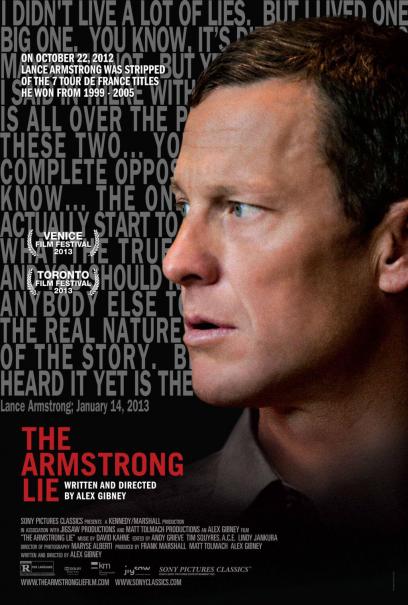 The Armstrong Lie
The Armstrong Lie
Directed by: Alex Gibney Documentary Running Time: 2 hrs 2 mins Rating: R Release Date: November 15, 2013 (Chicago)
PLOT: Lance Armstrong lies to the world, and to a director.
WHO'S IT FOR? Those still stunned by the Armstrong story, or curious about who the cycling figure really may be.
OVERALL
Amongst martyred Livestrong bracelets and the loss of the world's trust, another significant casualty of Lance Armstrong's "one big lie" is a documentary titled "The Road Back," directed by Alex Gibney. Privately considered a "puff piece" by the more-aware supporting characters to Armstrong's tragedy, it was meant to document Armstrong's comeback to competitive cycling in 2009, which itself was an effort to prove the accused biker had not doped during his past seven Tour de France victories. But instead of capturing the "phoenix" he thought Armstrong to be, Gibney got this figure's monumental fall from history's grace.
Armstrong was not lucky to have been placed alongside fact-addict, marathon doc director Alex Gibney, who admits in this film to being caught up in the excitement of Armstrong's arc, but was not ready to sit quietly when his main subject had made his own film a BS. Duped like many of us, but especially tricked into continuing Lance's fictional narrative, Gibney turned "The Road Back" into the frustrated take-down that is The Armstrong Lie, which aims to give an outsider's documentary version of the fictional narrative that is Armstrong's success.
Armstrong makes it clear, in the beginning of the journey that Gibney takes us on that, "The only person that can actually start to let people understand the true narrative is me." For whatever narrative that may be swirling in his head (Gibney told me that Armstrong is his own actor/writer/director), as witnesses to Armstrong's rewriting of himself, it makes for a fascinating story. Here is someone acting as himself, functioning on a lie that has changed whatever his true self was, and skewed us from ever knowing what his true self is.
With The Armstrong Lie, Gibney also provides an image of the Tour de France that nearly does what Blackfish does to SeaWorld. The personal outrage from Gibney is aimed not just at the performer who made a big lie personal, but with the event that turns riders like Armstrong into "pedaling machines," due to doping that is "killing the profession," to quote Louis Malle's 1962 documentary Vive le Tour, which haunts Gibney's film. Gibney shows the impossibility of the requirements within this archaic challenge through numerous terrain (and "that f**king mountain"), but also its secret community that relies on doping, which is protected by a code of silence. He has us recognize that what Armstrong did is certainly wrong, but also a part of the competition itself.
It is likely that the footage captured with great coverage from Armstrong's 2009 Tour de France has been kept as-is; in simpler terms it also makes for its own exciting section, and also a break from Gibney's straight-up journalism. While this footage must have provided an intriguing sports arc for "The Road Back," they make for even more exciting poetry as Armstrong faces his bizarro self in Alberto Cantador of the same team, with a whole different context; Armstrong now the disgraceful villain, Cantador the hero.
As The Armstrong Lie presents the unique hook in a documentary where a director comes to largely disdaining his subject, Gibney does not hold back in his frustrations. Because of this, part of the movie wanes to sensationalism. Juxtaposing videos to make Armstrong contradict himself is OK, but trying to serve him by offering a second definition of the word "cheat" feels a bit childish.
Without even considering the film's center scandal, one can tout Gibney lucky bad luck for the middle of one of the most fascinating figures in sports today. Here is an athlete that will do anything to win. As Armstrong states in the film, losing means death. A person who would do anything to win, to black out the history books for seven years if he has to (a remarkable statement Armstrong essentially makes in the end), or to risk having the world turn on him. Perhaps we were caught up in his lie because he was the perfect athlete, the romantic embodiment of the human spirit, yadda yadda yadda. Certainly now, in the activity of sportsmanship that puts great respect and responsibility behind those who train to publicly defy regular human ability, and rewards them with money and power, Armstrong has greedy contract-raising ballplayers beat at their own game.
FINAL SCORE: 7/10
